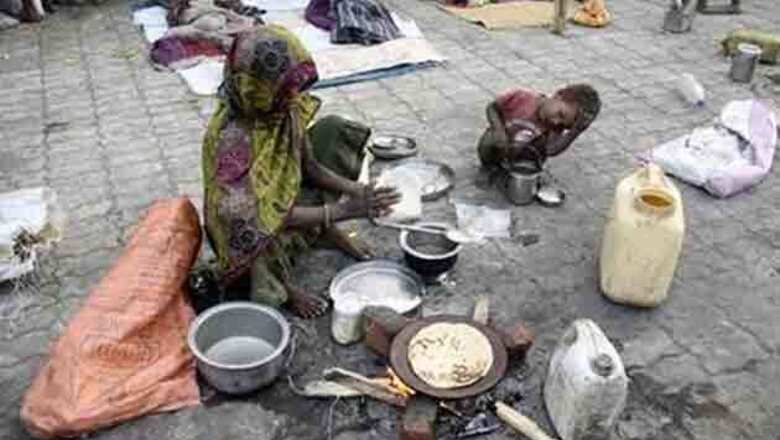
views
According to the world bank almost 70 per cent of Indians live on about Rs 120 a day. Are we losing or winning the war against poverty? Santosh Mehrotra, Director General of Institute of Applied Manpower Research, joined IBNLive readers for an interaction on the issue.
Q. I think we have not been able to exactly define who is poor and what is poverty, there are as many definitions as there are economists, India has 671 districts, and look at the number of NGO's that function in this country. There is report of 2009, am sure the numbers have increased as of today, India has possibly the largest number of active non-government, not-for-profit organizations in the world. A recent study commissioned by the government put the number of such entities, accounted for till 2009, at 3.3 million. That is one NGO for less than 400 Indians, and many times the number of primary schools and primary health centres in India. According to the government study, the largest number of NGOs are registered in Maharashtra (4.8 lakh), followed by Andhra Pradesh (4.6 lakh), UP (4.3 lakh), Kerala (3.3 lakh), Karnataka (1.9 lakh), Gujarat (1.7 lakh), West Bengal (1.7 lakh), Tamil Nadu (1.4 lakh), Orissa (1.3 lakh) and Rajasthan (1 lakh). More than 80 per cent of registrations come from these 10 states. Now all of them may not be working in the areas of Poverty Eradication, even if a quarter of them were engaged, the results would have been for the country to see, Why is that not even a single district of the 671 can boast of if being poverty free, same problems of sanitation, hunger, homeless poor. Malnutrition of kids and u can go on, when we such kinds of resource available in each district and state and then see the problem it gives us a feeling that we are losing war against poverty? Any bus stand, railway station in the suburbs, temples, slums, narrate the same story. Asked by: S ESHWAR
A. There is a money metric measure of poverty, the only one in the country. no other measures exist.
Q. There is a view in economics..if we were to redistribute the nations wealth equally to all, in about 6 months time this wretched poverty would again be evident as capable people will again corner the resources. Your views. Asked by: kpvidya1999
A. This is a theoretical concept of no practical value.
Q. In order to win the war against poverty, we need to empower and inculcate people to work and earn wages. But by doling out freebies, will it not make them more lazy? Funnily, this is almost true in the case of Kerala. Money started flowing into the state in the late 70 and early 80s onwards. By the late 00s the flow of money started coming down. That's when people found it difficult to adapt to the changed reality. Most of the work done is by the people from outside of the state. Your thoughts. Asked by: EM
A. Kerala is a model of development in India. Low infant mortality rate, highest literacy rate...on account of the State govt's investments in health and educ. Till 20 yrs ago its GDP was growing slowly...but its growth rate has been consistently higher in the last 2 decades than most other states. Result: The lowest poverty rate in India.
Q. Can any Government remove poverty completely form the Country? Is it not fooling the people? Is development not a continuous process (Abhyudaya parampara)? Asked by: Raghava Rao Karavadi
A. Yes, it is. but speed of poverty reduction is of the essence. India's demographic dividend will last only another 25 yrs. If we dont become a high income country in this time, by ensuring inclusive growth, this opportunity will never come back in future. We will become an aging society, without having become rich...which is now happening to China
Q. I believe over-population and corruption are the biggest obstacles for winning a war against poverty. What do you think? The government obviously won't do anything against corruption but what are the steps the government have taken to stabilize the population and what are your suggestions for improvement? Asked by: Sarkar
A. Pop growth rate has been declining since the early 1980s. It could have fallen faster if we had invested in the health and education of the masses, not just of the elite (who are engaged in this web chat). Educated people have fewer children. we still have 310 million illiterate people, because we still don't have all our children in school...310 mn illiterate is larger than India's total population in 1947. If we ensure that the illiterate and semi-literate acquire skills, they can become employable in non-agri jobs...which is what normally happens with econ development
Q. 70 percent on Rs. 120. Is this an average of 70 percent of Indians earning or actual 70 percent of population earning only Rs 120 and below? Asked by: sundar1950in
A. The latter.
Q. Food security,Freebies, Is the state responsible for making available food at reasonable cost, or supplying food at almost no cost? Will this not cause Poverty to remain where it is? Asked by: sundar1950in
A. No. if there are still 270mn living on less than rs 28 a day in rural and Rs 33 a day per person in urban areas, they cannot fully feed themselves. they need help...hence the Food Sec Bill. India has nearly half of its child pop undernourished, and a third of its adult pop malnourished. the NFSB is not a freebie...imagine the cost to the nation in terms of lost GDP!
Q. Human resources are for optimum utilisation. Mismatch, under utilisation, wrong employment, unorganised employment, if corrected could bring people out of poverty. Anything happening in this direction? Asked by: sundar1950in
A. Lots. Dev means that people move out of agri, into non-agri jobs. for the first time in India's history, after 2005 workers left agri for jobs in construction, manufacturing and services. that process has intensified recently. in total since 2005, 27 mn people left agri to join non-agri jobs. also, wages have risen sharply in real terms, after taking into account inflation. hence, consumption exp has risen, hence poverty has fallen.
Q. In the early 60s and for a decade more the Family planning was in force enforced. In spite of it we grew. Today we take credit of the demography saying that we have the largest young age group out beating China. This we say is our path to success. Has population size and poverty ratio been studied and if so what does it indicate? Asked by: sundar1950in
A. Between 1950 and 1980, our GDP growth rate was only 3.5 percent per annum. pop had been growing by 2.5 percent pa, so per capita income only grew at 1 percent pa. Family pl in the 1960s-1970s was a complete failure coz the poor dont change their fertility behaviour until they are sure their children will live. But the public health system was so appalling, it could not save lives of sick children. So people had more children than they needed...overcompensating. but with some improvement in health services, infants started to live longer, and that changed parents behaviour, not family planning.
Q. In terms of per capita and GDP India is far behind where it should have been. Economic development has been compromised on politics related to Vote Bank. Has the path of Socialism on a high note after Independence created a higher level of poverty? Asked by: sundar1950in
A. 'Socialist' policies led to slow GDP growth from 1950to 1980. That, and poor investment in health and education of the masses caused poverty.
Q. Poverty, if in relation to availability of food, India has and is improving. The import of food grains is almost not there. Hence do you agree that Poverty has been tackled well by Indians? Asked by: sundar1950in
A. No, if we had, there would not be 270 million poor, even though that poverty line is an extremely low poverty line.
Q. George Bernard Shaw said poverty is a crime. In India's context who are the criminals? Asked by: kpvidya1999
A. If India's young do not realise that we have only 25 more years left to realise the demographic dividend, we will lose the war on poverty forever and policies must change to focus on more investment in health, education, nutrition and sanitation (60 percent of world's pop that shits in the open is in India, causing ill health for all Indians). Also, if we don't grow our GDP at 8 percent per annum for each of the remaining 25 years in the demographic dividend, poverty will not fall to near zero.




















Comments
0 comment